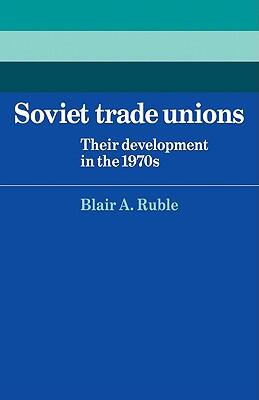
Soviet Trade Unions: Their Development in the 1970s
Ancora nessuna valutazione
Romance
History
Horror
Formato
Brossura
Pagine
204
Lingua
Inglese
Pubblicato
Dec 3, 2009
Editore
Cambridge University Press
Edizione
1
ISBN-10
052112445X
ISBN-13
9780521124454
Descrizione
In the 1970s, Soviet trade unions were at a pivotal moment in their evolution, influenced by the broader socio-political landscape of the time. The author, Blair A. Ruble, meticulously examines the intricate relationship between these labor organizations and the state, highlighting how unions navigated the complexities of a communist regime focused on control and centralization. Through detailed analysis, Ruble sheds light on how trade unions both reflected and responded to the changing needs and aspirations of Soviet workers during a period marked by stagnation and discontent.
Ruble delves into the internal dynamics of trade unions, exploring how they influenced worker rights while simultaneously acting as tools for governmental policies. This duality of purpose often left unions in a precarious position, balancing the demands of workers with the expectations of the state. The examination reveals the paradox of an institution designed to represent labor interests while remaining tightly woven into the fabric of a totalitarian system.
The exploration of this topic provides valuable insights into not just the unions themselves but also the life of Soviet citizens during a transformative era. By understanding these organizations, readers gain a deeper appreciation of the complexities of worker representation and the impact of political ideology on everyday life in the Soviet Union. Ruble's scholarship invites contemplation on the legacies of such systems, making it a compelling study for anyone interested in labor history, Soviet studies, or the interplay between state and society.
Ruble delves into the internal dynamics of trade unions, exploring how they influenced worker rights while simultaneously acting as tools for governmental policies. This duality of purpose often left unions in a precarious position, balancing the demands of workers with the expectations of the state. The examination reveals the paradox of an institution designed to represent labor interests while remaining tightly woven into the fabric of a totalitarian system.
The exploration of this topic provides valuable insights into not just the unions themselves but also the life of Soviet citizens during a transformative era. By understanding these organizations, readers gain a deeper appreciation of the complexities of worker representation and the impact of political ideology on everyday life in the Soviet Union. Ruble's scholarship invites contemplation on the legacies of such systems, making it a compelling study for anyone interested in labor history, Soviet studies, or the interplay between state and society.
Recensioni
Nessuna recensione ancora
Sii il primo a recensire questo libro e condividi i tuoi pensieri
Aggiungi Prima RecensioneRegistro di Lettura
Nessun registro di lettura trovato
Inizia a tracciare i tuoi progressi di lettura per vedere i registri qui
Aggiungi il tuo primo registro di letturaNote
Registro delle transazioni
Nessun registro delle transazioni trovato
Inizia a tracciare le tue transazioni di libri per vedere i registri qui
Aggiungi il tuo primo registro di transazione